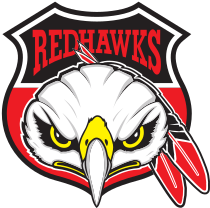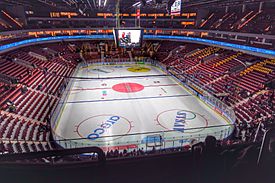Malmö Redhawks facts for kids
Quick facts for kids Malmö Redhawks |
|
|---|---|
| City | Malmö, Sweden |
| League | Swedish Hockey League |
| Founded | 28 February 1972 |
| Home arena | Malmö Arena (capacity: 12,600) |
| Colors | |
| Owner(s) | Malmö Redhawks Holding |
| General manager | Oscar Alsenfelt |
| Head coach | Tomas Kollar |
| Captain | Fredrik Händemark |
| Website | malmoredhawks.com |
| Franchise history | |
| 1944–1972 | Malmö FF Ishockey |
| 1972–2001 | Malmö IF |
| 2001–2004 | MIF Redhawks |
| 2004–present | IF Malmö Redhawks |
| Le Mat Trophy | 1992, 1994 |
The Malmö Redhawks are a professional ice hockey team from Malmö, Sweden. They play in the top Swedish league, the SHL. Their home games are held at Malmö Arena.
The team started in 1944 as part of the football club Malmö FF. In 1972, the hockey team became its own group, first known as Malmö IF. Later, in 2001, they changed their name to MIF Redhawks. In 2004, they became IF Malmö Redhawks, which is their official name today. The team's CEO is Patrik Sylvegård, who used to play for the team.
Contents
Team History
The Malmö Redhawks officially began on February 28, 1972. Before that, they were the ice hockey part of Malmö FF. When they became independent, they were called Malmö Ishockeyförening (MIF).
In their early years, the team played in lower divisions. In 1984, they were moved down to Division 2. This led to big changes, including a new chairman. They quickly moved back up to Division 1. There, Malmö IF made a huge effort to improve their team.
Reaching the Top League
The team worked hard to reach the top league. In the 1989–90 season, they finished first in their group. They then won the final series against MoDo 3–0. This win meant they were promoted to Elitserien (now called the SHL) for the first time.
They stayed in the top league for 15 seasons. During this time, they changed their name twice. First to MIF Redhawks in 1996, then to IF Malmö Redhawks in 2003. The team also won two Swedish Championship titles. These big wins happened in 1992 and 1994. They also won the European championship in 1992–93.
Challenges and Comeback
After many successful years, the team faced some tough times. At the end of the 2004–05 season, the Redhawks were moved down from Elitserien. They then played in HockeyAllsvenskan, which is Sweden's second-highest league. They managed to get back to Elitserien for the 2006–07 season.
However, in 2007, they again failed to stay in the top league. They were very close in 2008, leading the qualification series for a while. But they lost in the final game, and their rivals, Rögle BK, took the spot.
In the 2008–09 season, the Redhawks moved into their new home, the Malmö Arena. This is a modern sports and entertainment building. Despite the new arena, the team faced financial difficulties in 2009. They had to let go of their players to avoid serious problems. The team finished 8th that season, just missing the playoffs.
The Redhawks kept working to get back to the top. In 2011, they got a big investment deal. This money was meant to help them return to Elitserien. They signed several new players, including Linus Klasen, who became captain.
The team had ups and downs. They started the 2011–12 season well but then struggled. Their coach was changed, and they improved later in the season. However, they still did not qualify for the top league.
Rebuilding the Team
In early 2012, the team had to make big changes to their finances. They went through a process called "economic reconstruction." This meant they had to re-negotiate player contracts to lower costs. Some expensive players, like Linus Klasen and Hannu Toivonen, left the team.
After this, Patrik Sylvegård became the CEO and sports director. Mats Lusth, a former Redhawks player, became the assistant coach. The team had to sign many new players. Some players from the previous season stayed, like Pontus Sjögren and Tomas Kollar.
The 2012–13 season started slowly for the Redhawks. But they had a great November, winning many games. They ended up in fifth place by early December. However, they then had a losing streak in January. They finished ninth, which was their lowest ranking in a long time.
Return to SHL
The Malmö Redhawks spent eight seasons in HockeyAllsvenskan. This is the second-highest league in Sweden. In the 2014–15 season, they finished third in the regular season. This meant they qualified for the playoffs against Leksands IF.
The series was very close, tied 3-3 going into the final game. The Redhawks won the deciding game 4-2, securing their promotion. This victory meant the Malmö Redhawks were back in the SHL!
Since returning to the top league, the team has done well. They reached the semi-finals in the 2017 and 2018 seasons. They also made it to the quarter-finals in 2019.
Players and Team Members
Current Roster
| # | Nat | Player | Pos | S/G | Age | Acquired | Birthplace |
|---|
Last updated on 16 August 2024 You can find the full current roster on the official Malmö Redhawks website.
Honored Players
The Malmö Redhawks have honored several important players by retiring their jersey numbers. This means no other player on the team will wear that number again.
| No. | Player | Position | Career | No. retirement |
|---|---|---|---|---|
| 1 | Peter Lindmark | Goaltender | 1988–97 | 8 November 2011 |
| 5 | Roger Nordström | Goaltender | 1983–98 | 16 February 2015 |
| 18 | Patrik Sylvegård | Right wing | 1987–99 | 21 September 2000 |
| 21 | Jesper Mattsson | Center | 1991-95 1998-04 2010-12 |
29 February 2020 |
| 25 | Kaj Olsson | Left wing | 1975–86 | — |
| 66 | Mats Lusth | Defense | 1988-93 1996-00 |
12 January 2017 |
Famous Former Players
Many talented players have played for the Malmö Redhawks over the years. Here are some of the notable ones:
- Philip Falcone
- Peter Andersson
- Róbert Švehla
- Richard Park
- Raimo Helminen
- Mats Näslund
- Mats Hallin
- Fedor Fedorov
- Peter Hammarström
- Andreas Lilja
- Kim Johnsson
- Juha Riihijärvi
- Daniel Rydmark
- Jani Hurme
- Tomas Sandström
- Gustav Nyquist
- Carl Söderberg
- Martin Fehérváry
- Rasmus Andersson
- André Burakovsky
Team Achievements
Trophies Won
- Le Mat Trophy (2): 1992, 1994
- European Cup (1): 1992
See also
- Ice hockey in Sweden
 | Jessica Watkins |
 | Robert Henry Lawrence Jr. |
 | Mae Jemison |
 | Sian Proctor |
 | Guion Bluford |



